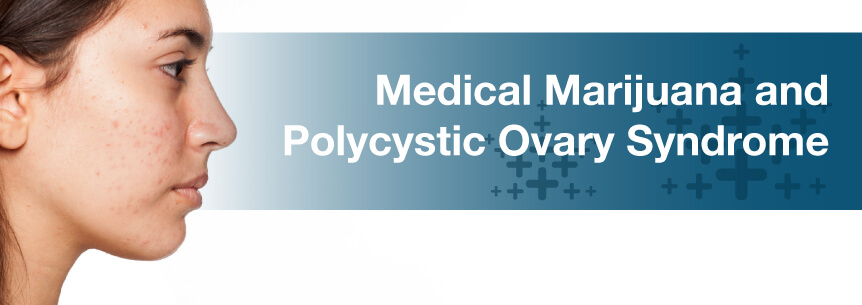
Quite a few conditions can affect women’s health, but what if there was a mysterious disorder that could lead to many different health complications and even cause infertility, and no one was talking about it? Unfortunately, unless you have polycystic ovary syndrome, you’ve probably never heard about it.
Polycystic ovary syndrome, or PCOS, is a heartrending condition affecting millions of women in the United States alone. However, its cause remains a mystery because it is the most underserved and underfunded disorder affecting women’s health today. Many medical professionals do not understand it, which means PCOS often goes undiagnosed. It leads to hormonal and metabolism problems that not only affect the health of women with the condition but can also change their appearance.
Sadly, there is no known cure for PCOS. However, some medications address a few of the individual concerns of women with the disorder. Fortunately, there may be a more natural option. Anecdotal evidence, as well as limited research, suggests cannabis could treat many of the symptoms associated with PCOS. Although more research is required, this offers hope to many women struggling with the side effects of this disorder.
Despite how undereducated most people are about polycystic ovary syndrome, the condition is quite common in childbearing women. It happens when there is an imbalance in reproductive hormones. Namely, women with PCOS have large amounts of male hormones and not enough female ones. Excessive amounts of androgens, a hormone found in larger quantities in men, create an imbalance with the female hormones progesterone and estrogen.
These hormone imbalances cause problems in the women’s ovaries, leading to menstruation irregularities and enlarged ovaries, as well as small cysts or a collection of fluid called immature ovarian follicles on the outer edges of the ovaries. PCOS patients also often fail to release eggs during their menstruation cycles.
Researchers and medical professionals aren’t sure what the cause of polycystic ovary syndrome is. It doesn’t matter what race or ethnicity you are — it can happen to any woman at any age. However, experts believe several different genetic and environmental factors could contribute to patients developing the condition.
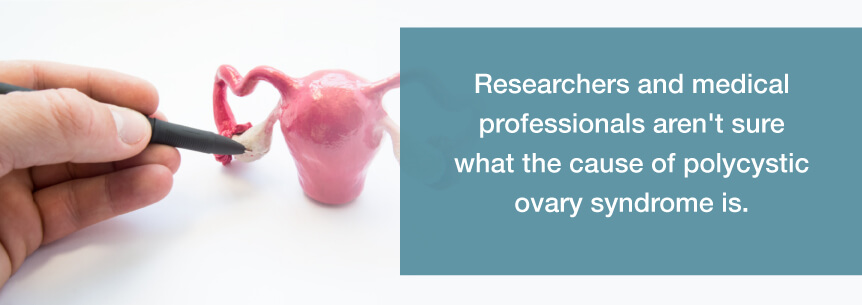
The first is increased levels of androgens. Although all women have androgen, men typically have more of it, and it leads to many of the traits associated with men, like male-pattern baldness. The hypersecretion of androgen can prevent ovaries from releasing eggs during the menstrual cycle.
Another factor associated with PCOS is higher levels of insulin. This hormone controls how your body changes food into energy. Many women with polycystic ovary syndrome also have insulin resistance, which means the body’s cells don’t respond to insulin the way they should. As a result, insulin blood levels in PCOS patients are higher than average because the body attempts to produce more insulin to compensate for the deficiency. This excess may be what causes increased androgen production.
Other risk factors could influence the development of PCOS, including:
Even though polycystic ovary syndrome affects one in five women, many of the aspects of the condition remain a mystery. It may have long been a cause of female infertility, but the first known mention of the disorder wasn’t until 1721. An Italian scientist named Antonio Vallisneri wrote about an infertile married woman with large ovaries the size of pigeon eggs which had a shiny, white appearance on their surface.
In the 1920s, two American gynecologists made groundbreaking discoveries around this condition — Irving F. Stein, Sr., and Michael Leo Leventhal. These men found PCOS to be a distinct disorder in and of itself, and they also defined many of the characteristics associated with the condition. Because of their work, the disease was originally named Stein-Leventhal syndrome. In the 1990s, the National Institutes of Health clearly outlined how the disorder could be diagnosed and renamed it polycystic ovary syndrome.
Because there is no universal definition of polycystic ovary syndrome, it’s hard to determine how many women suffer from the condition. However, estimates suggest:
Patients and doctors alike misunderstand PCOS, and because of widespread misinformation, many people don’t know:
There are many different symptoms associated with polycystic ovary syndrome. Each patient is different and may experience some symptoms while not suffering from others. Usually, the signs of PCOS develop around the time of a woman’s first period. However, other women don’t get PCOS until later in life, often as a result of increased weight gain. The three most common signs associated with the disorder are:
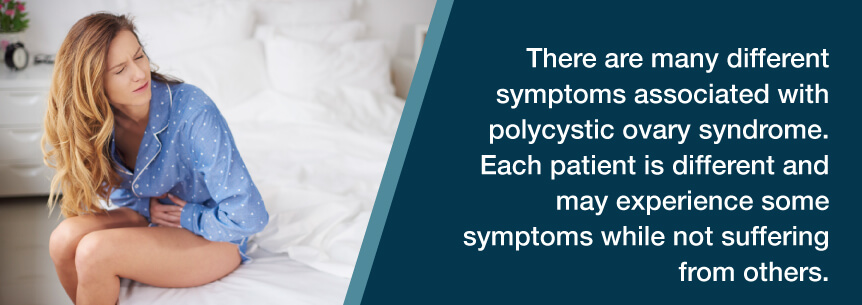
However, because of increased levels of androgen and polycystic ovaries, the condition can lead to other side effects.
Physical symptoms:
Internal symptoms:
Early diagnosis of polycystic ovary syndrome is key because the condition can lead to many dangerous complications. The most frustrating and disheartening of these is the risk of infertility. However, because of its association with insulin resistance, PCOS can also lead to metabolic syndrome, diabetes, and heart disease. A 2005 study also showed women with PCOS are more likely to suffer from depression or another mood disorder.
Other serious health complications that could arise in patients with polycystic ovary syndrome include:
Most women begin to suspect there might be a problem when they have difficulties getting pregnant in their 20s or 30s, though polycystic ovary syndrome isn’t the only reason a woman might have trouble conceiving. Doctors don’t have a single test that can definitively diagnose PCOS. However, if a patient has at least two of the three most common signs associated with the condition, they will usually come to this diagnosis.
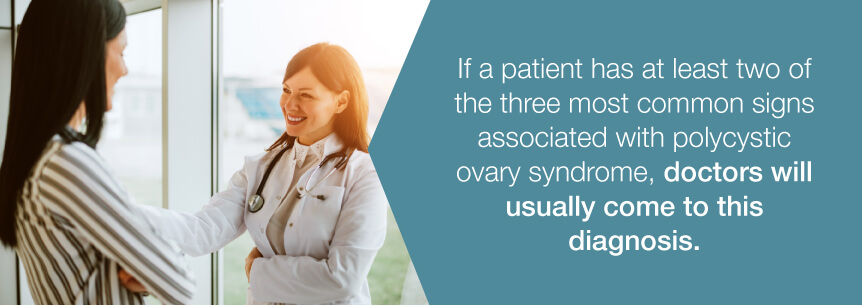
Tests used to confirm a polycystic ovary syndrome diagnosis include:
Patients need to seek treatment for polycystic ovary syndrome as soon as possible to avoid any of the serious complications associated with the disorder. However, because not all patients present all symptoms, doctors usually tailor treatment plans to the needs of the patient. Physicians recommend some lifestyle changes that will help patients lose weight and thus increase the effectiveness of any medications or treatment plans. These include a low-calorie diet and moderate exercise.
Doctors may also recommend a variety of medications to help deal with PCOS’ most common symptoms. However, all have associated side effects and risks.
To regulate the menstrual cycle:
To help patients ovulate:
To reduce excessive hair growth:
Although medical marijuana is not a cure for polycystic ovary syndrome, it could be a potential treatment option for many women with this condition. Unfortunately, there haven’t been any research studies to examine the effects of medical cannabis on polycystic ovary syndrome specifically. However, rising evidence suggests this disorder may be tied to a dysfunction in the endocannabinoid system (ECS). Endocannabinoid therapy, like medical marijuana, could be used to supplement what the body needs.
Find A Doctor Find A Dispensary
What makes cannabis an effective treatment option for so many different medical conditions? It is made up of chemical compounds called cannabinoids that are similar to those naturally produced by our body’s endocannabinoid system (ECS).
The ECS is a series of receptors found in every major bodily system. This network keeps almost every physiological function in a state of homeostasis, from digestive health and pain modulation to the reproductive system. Naturally produced cannabinoids are constantly acting on these receptors to elicit chemical responses and keep the different bodily systems in balance.
A 2013 scientific review in the Journal of Molecular Endocrinology suggests the mysterious cause of polycystic ovary syndrome may actually be dysfunctions in the endocannabinoid system. The ECS may also have a hand in the condition’s other underlying features, such as:
Evidence suggests that cannabinoids in marijuana could be potential treatments for PCOS. Cannabinoids within the plant, like CBD and THC, can bind to endocannabinoid receptors to assist the ECS in regaining balance. With further development, medical marijuana treatments could help treat insulin resistance, fight obesity, and bring balance to reproductive functions in women with PCOS. Additional research may discover cannabis could be the most effective treatment available. Until then, medical marijuana has other benefits for patients with this condition in its treatment of symptoms.
Cannabis could be an effective treatment for the underlying causes of polycystic ovary syndrome, and it also helps relieve a few of the associated symptoms. One of the most recognized uses for medical marijuana is the treatment of pain. PCOS can cause severe abdominal pain if cysts develop, and cannabis works with the ECS to provide an analgesic for all kinds of pain.
There is also evidence women with PCOS are more susceptible to depression. Patients throughout the U.S. use cannabis to help treat depressive symptoms. Not only does it provide them with a boost in energy, but it also can alleviate persistent negative thoughts to give patients a brighter outlook.
With the rise in popularity of marijuana treatments in states where the plant is legal for medicinal use, the industry has boomed. There are now hundreds of strains available, so it may be difficult to determine which strain would be most effective for the treatment of polycystic ovary syndrome. Here are some recommendations that may help alleviate the side effects of the condition.
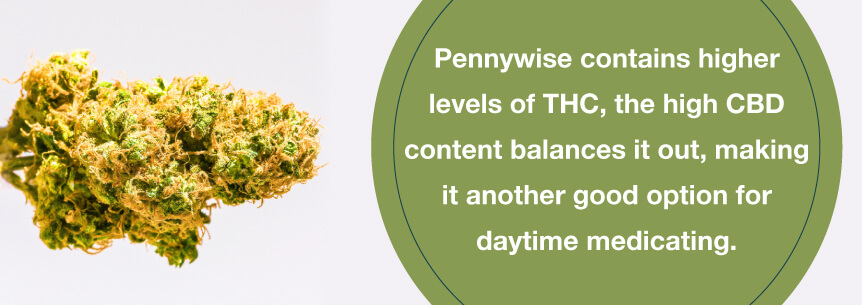
Patients with PCOS can use many ingestion methods to take medical marijuana treatments, including vaporization, smoking, edibles, and oils. As a way to measure cannabis medications in accurate doses, many women prefer to use cannabis oil by placing it under their tongue as a tincture. This way they can more accurately gauge how well the treatments are working and if there are any side effects associated with its use.
If you’re a woman with polycystic ovary syndrome and you live in a state where medical marijuana is legal, find out if this treatment option is right for you. Although cannabis is not a cure, it may be able to alleviate some symptoms you’re experiencing from your condition. There are no deaths associated with the use of medical marijuana, but there are potential side effects, so speak to a marijuana doctor today. They can assess your condition and determine if you qualify for your state’s program. They can also offer strain and dosage recommendations to help you come up with a treatment plan for your PCOS.
Find A Doctor Find A Dispensary
The content on this page is for informational purposes only and is not intended to be professional medical advice. Do not attempt to self-diagnose or prescribe treatment based on the information provided. Always consult a physician before making any decision on the treatment of a medical condition.